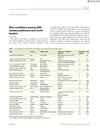 15 citations,
April 2019 in “Best Practice & Research Clinical Endocrinology & Metabolism”
15 citations,
April 2019 in “Best Practice & Research Clinical Endocrinology & Metabolism” Polycystic Ovary Syndrome (PCOS) in teenagers is a complex condition linked to genetics and environment, often associated with obesity and insulin resistance, and is treated with lifestyle changes and medication.
 15 citations,
February 2017 in “Nursing Clinics of North America”
15 citations,
February 2017 in “Nursing Clinics of North America” Targeted cancer therapies can cause skin side effects, which should be treated early to help patients' quality of life and treatment adherence.
 12 citations,
July 2019 in “The Aging Male”
12 citations,
July 2019 in “The Aging Male” Men in the U.S. have more health issues, higher death rates from various diseases, lower life expectancy, and are less likely to seek healthcare.
 11 citations,
March 2021 in “Dermatology and therapy”
11 citations,
March 2021 in “Dermatology and therapy” Researchers created a new tool to measure the effects of alopecia areata from the patient's view, focusing on hair loss, daily life, and emotional health.
 10 citations,
August 2023 in “Advanced Science”
10 citations,
August 2023 in “Advanced Science” Nitric Oxide has potential in medicine, especially for infections and heart treatments, but its short life and delivery challenges limit its use.
10 citations,
January 2019 in “Indian Journal of Dermatology” Early-onset male hair loss is linked to metabolic syndrome, suggesting a need for heart health monitoring and lifestyle changes.
 10 citations,
November 2010 in “Journal of Pharmacy Practice”
10 citations,
November 2010 in “Journal of Pharmacy Practice” The document says PCOS is a common hormonal disorder in women, diagnosed by certain criteria, and managed with lifestyle changes and various medications.
 8 citations,
October 2013 in “The Journal of Spinal Cord Medicine”
8 citations,
October 2013 in “The Journal of Spinal Cord Medicine” Most spinal cord injury patients in Korea experience skin problems, especially fungal infections and eczema, affecting their quality of life.
 7 citations,
January 2019 in “Aesthetic Plastic Surgery”
7 citations,
January 2019 in “Aesthetic Plastic Surgery” Patients felt happier with their looks and younger after hair transplant surgery, but their well-being and social life didn't change much.
 6 citations,
August 2023 in “Fertility and Sterility”
6 citations,
August 2023 in “Fertility and Sterility” The 2023 guideline for PCOS suggests using updated diagnostic criteria, assessing related health risks, and recommends lifestyle changes and specific treatments for symptoms and fertility issues.
 6 citations,
August 2023 in “European journal of endocrinology”
6 citations,
August 2023 in “European journal of endocrinology” The 2023 guideline advises a detailed approach for PCOS, focusing on early detection, lifestyle and medical treatments, and managing health risks.
 6 citations,
October 2005 in “Indian Journal of Dermatology”
6 citations,
October 2005 in “Indian Journal of Dermatology” The document discusses male and female pattern hair loss, its diagnosis methods, FDA-approved treatments like finasteride and minoxidil, their side effects, and the role of lifestyle changes.
 5 citations,
October 2022 in “Heliyon”
5 citations,
October 2022 in “Heliyon” Polycystic ovary syndrome, a disorder causing menstrual issues and infertility, can be treated with lifestyle changes, medication, herbal remedies, surgery, and assisted reproductive techniques like artificial insemination and IVF.
 5 citations,
September 2021 in “Cureus”
5 citations,
September 2021 in “Cureus” Depression in women with Polycystic Ovarian Syndrome (PCOS) is linked to insulin resistance and hyperandrogenism, and managing these can help reduce depression. Lifestyle changes and Cognitive Behavioral Therapy can be effective treatments.
5 citations,
October 2017 in “JOGC/Journal of obstetrics and gynaecology Canada” The conclusion is that proper diagnosis and long-term treatment, including medication, hair removal, and lifestyle changes, are important for improving hirsutism, especially in PCOS patients.
 3 citations,
July 1997 in “Current problems in dermatology”
3 citations,
July 1997 in “Current problems in dermatology” Hair restoration surgery has evolved over time, with a focus on natural-looking results and managing patient expectations, while also considering potential complications and the lifelong progression of male pattern baldness.
 2 citations,
July 2021 in “Journal of The European Academy of Dermatology and Venereology”
2 citations,
July 2021 in “Journal of The European Academy of Dermatology and Venereology” Many 20th century politicians had skin conditions, with vitiligo being most common, affecting their image and political life.
 2 citations,
March 2016 in “InnovAiT”
2 citations,
March 2016 in “InnovAiT” PCOS is a common hormonal disorder in women, often involving menstrual issues and increased diabetes risk, managed through lifestyle changes and targeted treatments.
 2 citations,
January 2012 in “Journal of metabolic syndrome”
2 citations,
January 2012 in “Journal of metabolic syndrome” The document concludes that hirsutism can be managed with various treatments tailored to the individual, potentially improving quality of life.

research Skin
2 citations,
January 2011 in “Elsevier eBooks” Skin problems are common in Lupus patients and can indicate the disease's severity, requiring specific treatments and lifestyle changes.
 2 citations,
September 2009 in “Nurse Prescribing”
2 citations,
September 2009 in “Nurse Prescribing” PCOS affects many women, causing various symptoms and health risks, and is managed through lifestyle changes, medication, and support groups.
 2 citations,
March 2008 in “Hair transplant forum international”
2 citations,
March 2008 in “Hair transplant forum international” Hair restoration surgery can improve happiness, confidence, and social aspects of life, especially in younger patients with early hair loss.
 1 citations,
November 2023
1 citations,
November 2023 PCOD mainly affects young women, causing symptoms like irregular periods and weight gain, with mixed success from lifestyle changes and medication.
 1 citations,
July 2023 in “Journal of Clinical Medicine”
1 citations,
July 2023 in “Journal of Clinical Medicine” Different causes of beard hair loss have various treatments, including medications, lifestyle changes, and procedures to stimulate hair growth.
 1 citations,
June 2023 in “Cureus”
1 citations,
June 2023 in “Cureus” Many women with seborrheic dermatitis also have acne and diabetes, and should be checked for these conditions to help improve their quality of life.

A functional medicine approach may help long COVID patients by focusing on adrenal fatigue, gut health, and vitamin D deficiency, using diagnostic tools and lifestyle changes.
 1 citations,
February 2022 in “PLOS ONE”
1 citations,
February 2022 in “PLOS ONE” Hair loss is more common in male Chinese college freshmen, and it's linked with rosacea but doesn't affect their quality of life.
 1 citations,
September 2021 in “Fertility and Sterility”
1 citations,
September 2021 in “Fertility and Sterility” American men seeking infertility evaluation are generally older, more obese, have longer infertility duration, and different lifestyle habits compared to Canadian men.
 1 citations,
November 2015 in “Indian Journal of Clinical Biochemistry”
1 citations,
November 2015 in “Indian Journal of Clinical Biochemistry” The conference presented findings on how vitamin D levels, genetic factors, and lifestyle choices like smoking and yoga affect various health conditions and diseases.
 1 citations,
January 2010 in “Elsevier eBooks”
1 citations,
January 2010 in “Elsevier eBooks” Any drug can cause skin reactions, but antibiotics, NSAIDs, and psychotropic drugs are more common, with some reactions being life-threatening.



























